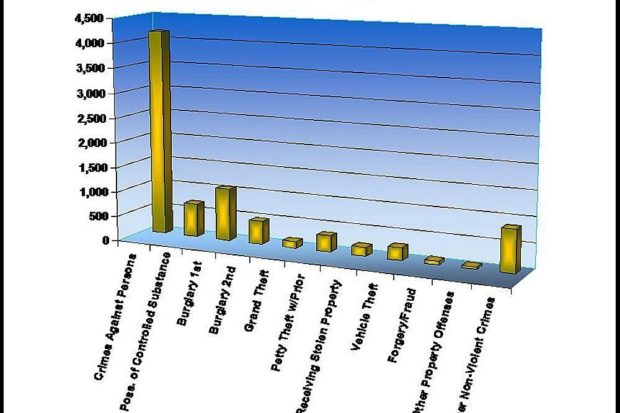

By Boston Woodard
For four decades, politicians and the public have expanded prisons and toughened laws such as Three Strikes, but now many analysts say the pendulum appears to be swinging in a new direction.
A post-election voter survey disclosed why Proposition 36 passed by a 2-1 margin. Here are the key findings by Californians for Safety and Justice (www.safeandjust.org):
- To eliminate unnecessary and ineffective life sentences for nonviolent, non-serious offenses.
- To save California millions of dollars every year by reducing the amount of prison resources devoted to warehousing low-risk offenders.
- To reduce the negative impact of unnecessary long sentences on people and their families.
This information was included in the newsletter published by long-time Three Strikes opponent Barbara Brooks of Sentencing and Justice Reform Advocacy (SJRA; www.SJRA1.com).
Eighteen years after the Three Strikes Law was approved, voters overwhelmingly amended the law69.1% to 30.9%. It eliminated minor, nonviolent crimes as a third strike.
Three Strikes rocketed into law shortly after Richard Allen Davis kidnapped and murdered young Polly Klaas in Petaluma, Calif.
An estimated 2,800 prisoners will be eligible to apply for sentence modification under the measure, said the California Department of Corrections and Rehabilitation (CDCR).
Over the years, many stories emerged of men and women sentenced to state prison for minor offenses such as stealing pizza, shoplifting clothes or making off with small amounts of food.
One San Quentin prisoner who qualifies for possible re-sentencing is 51-year-old Carl Wayne Wyatt from Kern County. According to Wyatt’s court papers, he was convicted of possession of a dirty spoon with dried up cotton in it. He received a 25-year-to-life sentence. Wyatt has no history of serious or violent crimes in his record.
If approved for release, “I’ll be able to gain back my life,” Wyatt said. “I’ll be able to see my three grandkids, who I’ve never seen. I can’t wait to get back working in the oil fields and to work as a certified volunteer firefighter, as I was. The state will never put handcuffs on me again.”
According to a Sacramento Bee article by Michael Montgomery, the California District Attorneys Association is recommending that “district attorneys file subpoenas for the prison records of inmates seeking resentencing hearings” before decisions are made on any sentence modification.
The newspaper explained that the courts would be looking at “everything from the offenders’ health and psychological profile to their participation in rehabilitation programs.”
Some believe one of the reasons Prop 36 passed was to assist in bringing down the CDCR’s prisoner population. With so few prisoners benefiting from the passage of the initiative, it will hardly make a dent in California’s prisoner count.
The nonpartisan Legislative Analyst’s Office (LAO) estimates Prop 36 will save tens of millions of dollars annually and as much as up to $100 million annually in the long run.
Voters believed the original Three Strikes Law would apply only to serious or violent crimes, said Greg Tabarez, a 59-year-old construction worker. He was sentenced to 25 years to life for “simple possession” of a controlled substance.
 Tabarez said the law should have been changed years ago, explaining that “the lives of many low-risk offenders have been ruined because of this mean-spirited law.”
Tabarez said the law should have been changed years ago, explaining that “the lives of many low-risk offenders have been ruined because of this mean-spirited law.”
Since the election, some potentially eligible prisoners are concerned they may be denied resentencing because of prison disciplinary action. They feel the disciplinary process is unfair because many prisoners are not allowed to present witnesses and evidence on their behalf. Even though officials claim the hearings protect constitutional rights, some prisoners feel this is not always the case.
Here is an example of how the prison disciplinary process sometimes works:
One prisoner who asked to remain unnamed received a rules violation for “tattoo paraphernalia.” It was a set of “approved” guitar strings. A prisoner must turn in a set of strings to receive a new set. It was a clear misunderstanding by the reporting employee. When the prisoner proved the strings were legally his, the prison’s appeals coordinator changed the charge to “possession of dangerous contraband,” a seemingly worse charge.
The prisoner requested that he be entitled to his basic due process rights to confront evidence but was told the evidence/strings were destroyed per institution policy. He felt that the highest level on the appeal, the director’s level, told him that he was untrustworthy and whatever prison officials said about his conduct must be true.
The concern is that such an incident might prompt denial of a chance at freedom, even with no serious or violent crimes on their prior or current record.
“At some point, the pendulum has to swing back the other way regarding Three Strikes,” said Palo Alto attorney Dan Barton on a recent visit to San Quentin.” With Proposition 36 being passed, it seems to be doing just that.”
Barton called Prop 36 a minor change in the law, adding, “We needed to do something to fix this law, and Proposition 36 was a good start.”
Here are comments from three elected California district attorneys who supported Prop 36:
- Steve Cooley of Los Angeles: “The punishment should fit the crime.”
- Jeffrey Rosen of Santa Clara County: “Proposition 36 ensures consistency and justice under the Three Strikes Law.”
- George Gasçonof San Francisco: “The Three Strikes Reform Act saves California taxpayers money and restores the original intent of the law by focusing on truly dangerous criminals.”
All three agreed that Prop 36 was intended to amend the Three Strikes Law for those offenders with nonviolent/non-serious crimes. Historically, Los Angeles and San Francisco have been politically conflicting in their vision of crime and punishment.
Barton also said, “In Santa Clara County, officials from the District Attorney’s Office, the Probation Department, the Public Defender’s Office and other court representatives have put together a ‘sentencing package’ to be used in each case. It’ll be almost like a parole hearing.”
He added, “All completed forms and documents will be evaluated before a sentence modification is decided. The judge will ultimately decide any change in an eligible prisoner’s sentence.”
Barton cautioned that a prisoner who qualifies for sentence modification under Prop 36 would have one shot at his or her freedom via the hearing. However, if denied, Barton said that decision could be appealed to a higher court. He made his comments during a talk before the San Quentin Journalism Guild and a subsequent interview.
“There is more to do on the Three Strikes Law, and we are giving serious thought to that,” Barbara Brooks told the San Quentin News in a telephone interview.
She said her organization is in it for the long run. The SJRA wants to form a coalition of Three Strikers, both inside and outside prisons. “There are many who want to continue and help those who don’t make it out,” she said.
Brooks said she believes those who do get out “owe it to the ones left behind, possibly all prisoners…because what they do after released will form the attitudes that the public and those in government will have toward prisoners in general.”
Offenders in the category of Crimes Against Persons and 1st Degree Burglary are not eligible under Prop 36. However, offenders in each of the other categories meet the nonviolent/non-serious criteria that allow the offenders’ sentence to be reconsidered by a judge.
*****
Boston Woodard is a prisoner/journalist. He has written for the San Quentin News and the Soledad Star and edited The Communicator. Boston is the author of Inside the Broken California Prison System, which is available at Amazon. Learn more at www.brokencaliforniaprison.com.

